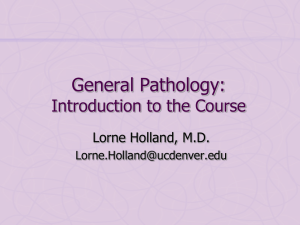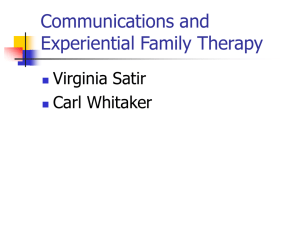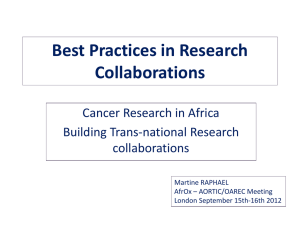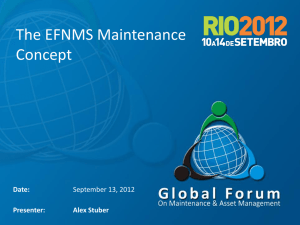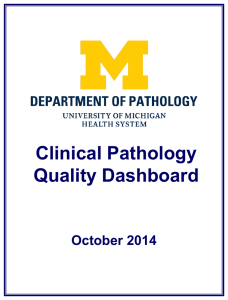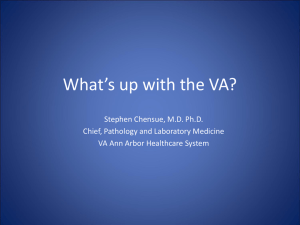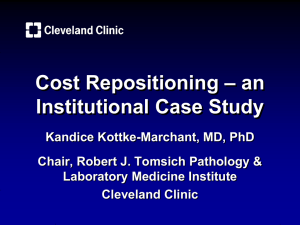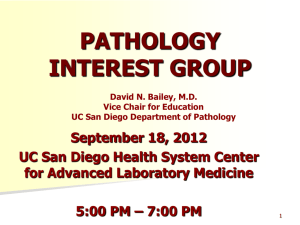update for apan_pathology qualification review
advertisement
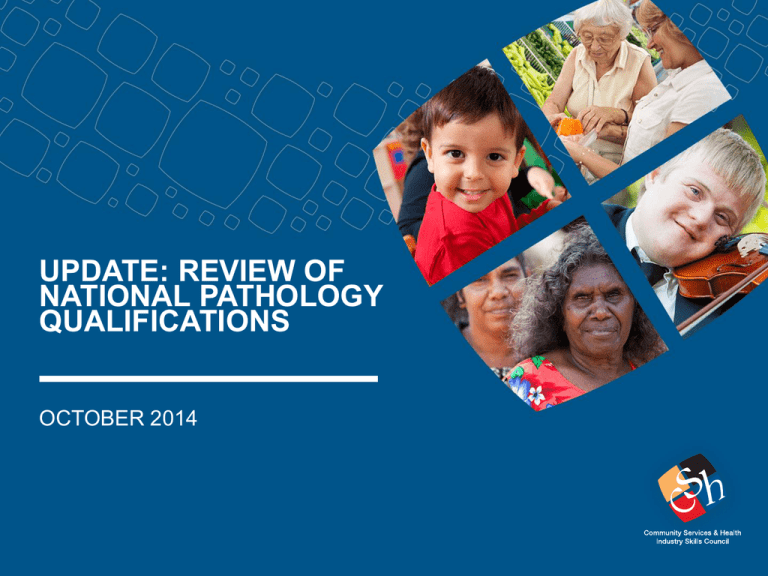
UPDATE: REVIEW OF NATIONAL PATHOLOGY QUALIFICATIONS OCTOBER 2014 STATUS OF REVIEW Two rounds of public consultation complete CS&HISC and Subject Matter Expert Group currently finalising content (expected by end of year) New qualification will be submitted for endorsement in June 2015 after external quality assurance and editing processes Key changes: • Single benchmark qualification at Certificate III • Improved clarity and much stronger assessment requirements – work placement of 35 minimum number of clients (20 for venous blood collections with 5 to be directly observed by assessor); specification of range of skills, techniques and equipment required to show evidence of competency • Removal of duplication CS&HISC THANKS MEMBERS OF OUR SUBJECT MATTER EXPERT GROUP FROM THE FOLLOWING ORGANISATIONS Australian Pre-analytical Network Dorevitch Pathology Douglas Hanly Moir Healthscope Melbourne Pathology Pathology Australia Pathology Queensland Pathwest CERTIFICATE III AS SINGLE BENCHMARK QUALIFICATION A key focus in stakeholder discussions in Pathology has been the importance of having a single qualification that becomes the benchmark for quality pathology collection work in Australia. The major focus was quality. After much discussion, the proposal is that this qualification be the Certificate III, with significantly increased assessment requirements in units of competency. This perspective is in line with the findings of the recent DoHA Best Practice Pathology Collection report, which also focuses on Certificate III as the main qualification that applies to work in the area. Note: the question of whether the collection qualification should stand alone or be combined with a Pathology Assistant outcome is still to be finalised. CERTIFICATE III AS SINGLE BENCHMARK QUALIFICATION (contd) CS&HISC acknowledges that some stakeholders would prefer the single qualification to be Certificate IV. However, in evaluating the alignment of the qualification, CS&HISC and the Subject Matter Expert Group also referred to the specifications for Certificate III in the Australian Qualifications Framework that seemed to better reflect the work of collectors (excerpt below, full details at www.aqf.edu.au): Graduates of a Certificate III will demonstrate the application of knowledge and skills: With discretion and judgment in the selection of equipment, services or contingency measures To adapt and transfer skills and knowledge within known routines, methods, procedures and time constraints In contexts that include taking responsibility for own outputs in work and learning, including participation in teams and taking limited responsibility for the output of others within established parameters Allied to the point above is the view that career pathways into supervision or training required individuals to undertake training in areas other than Pathology, rather than different clinical pathology skills. Hence qualifications in frontline management or training were required, rather than a Certificate IV in Pathology. Current qualification https://training.gov.au/TrainingComponentFiles/ HLT07/HLT32612_R1.pdf PROPOSED UNITS Pathology units: HLTPAT001 HLTPAT002 HLTPAT003 HLTPAT004 HLTPAT005 HLTPAT006 HLTPAT007 Identify and respond to clinical risks in pathology collection Perform venous blood collections Perform capillary blood collections Collect pathology specimens other than blood Collect specimens for drugs of abuse testing Collect arterial blood samples Receive, prepare and dispatch pathology specimens Broader units : BSBCUS201B BSBMED301B CHCCOM005 CHCDIV001 HLTINF001 HLTWHS001 Deliver a service to customers Interpret and apply medical terminology appropriately Communicate and work in the health and community sector Work with diverse people Comply with infection control policies and procedures Participate in safe work practices STAY IN TOUCH cshisc.com.au youtube.com/cshisc twitter.com/cshisc linkedin.com/cshisc facebook.com/cshisc vimeo.com/cshisc What will APaN be looking to do? • Have some 1 day workshops bringing RTOs and employers together • Allow discussion about the implementation of new quall • Allow some benchmarking • Discuss how work placement arrangements might work


